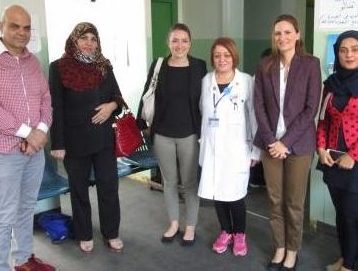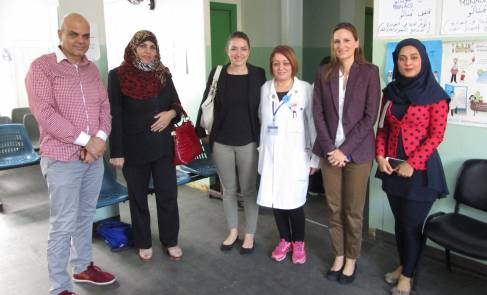Programme Coordinator, Emilie Silvestre, and Programme Officer, Laetitia Vecchierini, from the Government of Monaco have visited the United Nations Relief and Works Agency (UNRWA) Lebanon Field Office to see first-hand the implementation of Monaco-funded projects.
Since 2013, “Improving Diabetes Care for Palestine Refugees in Lebanon” has strengthened the quality of diabetes care, especially in the prevention and early detection of disease complications and associated illnesses. The recent American University of Beirut socioeconomic survey in Lebanon 2015 showed that 6.7 percent of Palestine refugees in Lebanon and 4.8 percent of Palestine refugees from Syria suffer from diabetes, suggesting that this intervention is of critical importance.
The Monaco delegation visited the Shatila refugee camp and had the opportunity of meeting and discussing the positive outcomes of the project with trainees at the Shatila Health Centre. The delegation also visited the Beirut Polyclinic, where they witnessed the utilisation of equipment and laboratory kits needed to screen and monitor diabetes mellitus. They also attended a diet awareness session and a discussion with patients about diabetes, how to manage it and how to prevent it through a proper diet.
As part of the project, health awareness campaigns were also conducted and education materials, such as posters and pamphlets, were produced to inform Palestine refugees about preventive measures, including advice on diet, risk factors and early symptoms.
Thanks to the support of Monaco, 40 medical officers and 35 nurses selected from UNRWA health clinics and centres were trained on the screening, early identification and management of diabetes mellitus by the Lebanese University.
“Given a continued shortfall of funds affecting UNRWA’s core service provision, the partnership and support from Monaco to improve health-care services for Palestine refugees in Lebanon is invaluable to the Agency,” said UNRWA Deputy Director, Sebastien Laplanche.
Monaco has been contributing substantially to the Agency’s health projects since 2011, initially on cardiovascular care and currently on diabetes. “It is our State’s responsibility to contribute to addressing refugees’ needs and working with UNRWA is one part of our response,” said Bénédicte Schut, Director of the International Cooperation Office in Monaco.
The international development policy of the Government of Monaco is focused on fighting poverty. In accordance with national policies of partner countries, Monaco intervenes in three priority areas: health, education and socioeconomic integration. Each year, Monaco provides support to more than 130 projects in 12 partner countries in Subsaharan Africa and the MENA region.
UNRWA is confronted with an increased demand for services resulting from a growth in the number of registered Palestine refugees, the extent of their vulnerability and their deepening poverty. UNRWA is funded almost entirely by voluntary contributions and financial support has been outpaced by the growth in needs, making Monaco’s contribution all the more important. (Source: UNRWA)
Monaco's support "invaluable" says UNRWA

